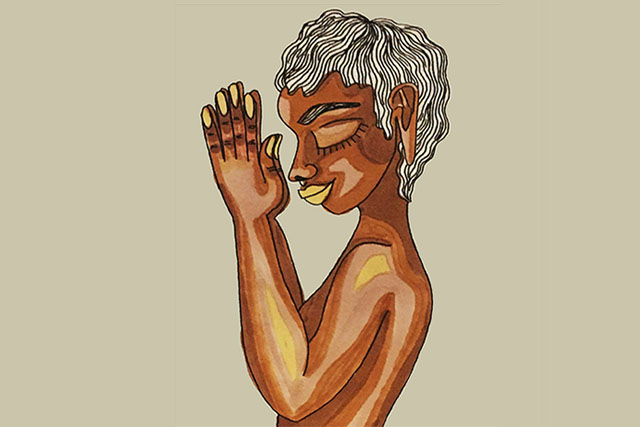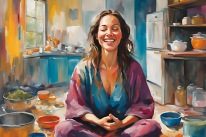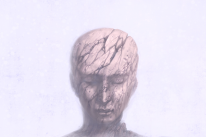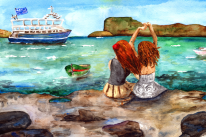
“There is more wisdom in your body than in your deepest philosophies.” ~Friedrich Nietzsche
Parked in a dimly lit garage in the middle of the city at around 7pm, I sat in the driver’s seat, seatbelt still on, texting two different male acquaintances who had expressed sexual interest in me.
“What are you up to tonight?” Waiting for a response back, I checked my phone every few minutes. The resounding emptiness in me that craved to be filled felt like it was growing deeper. After some time of getting immersed in social media, I receive a response back: an invitation from one man to come over to his house for dinner not too far away.
That night, I ended up drinking several glasses of wine too many, engaging intimately with the man beyond my intention and consent, and feeling emptier than before as I left his apartment in the morning.
Despite the gaping presence I felt inside, I was able to distract myself. I was a woman in her early twenties with a stable, corporate job. I also had a part-time job that got me out, socializing and exploring the city. I was doing something with my life, and I was just having a good time.
When my mother expressed some resistance to my social life because I wasn’t spending much time with my family, I responded to her feelings with agitation and dismissal; there she was again, being overly sensitive and ruining my fun.
Two days later, I had a fully booked day of hot yoga at 5am, a full day at the office, and then an hour-long drive to the city for an evening celebration for my part-time job. That night, after receiving and celebrating a promotion to a senior position on my part-time team, I began a drive back to the suburbs just past midnight only to wake up to the winds of a cold, lonely highway.
It was Wednesday morning at 1am when I fell asleep at the wheel while driving the long stretch between the city and the suburbs. I awoke to a dramatic and jolting swerve into a bush, grazing the windshield at first, and then, within a blink, shattered glass and metal crashed into Highway 280’s center divide.
Shocked by the sight of stark headlights on cement, smoke rising, and a deflated airbag that had just slapped me in the face, I thought, “Was this a dream? Please let it be a dream.”
A few speeding cars left me behind in a body ridden with shock, invisible and alone on the interstate. In deep dread and fear at the realization that it wasn’t a dream, I lifted my leg in throbbing agony; it was the heavy deadweight of broken bone. I looked down to see the orange toenails of a swollen foot hanging dementedly, disconnected from my leg.
The police officer that found me came by to peek into my car through the wreckage, flashlight blinding as it pointed at my squinting eyes and pained body. He told me that the ambulance was on its way and asked if I had been drinking.
“Yes… earlier,” I confessed before he went back to his patrol car that felt miles away. I worried that he had moved far away in case my car exploded; I was petrified of dying there on that freeway from the flames of this grave mistake.
The blinding sterility of the hospital emergency room at 1:30am was cutting. Cutting off the green chiffon dress I had recently celebrated a job promotion in. They tore it straight up the middle. Cutting open my underwear without remorse, cold scissors sliding over me, leaving me vulnerable and without voice.
I was exposed on a cold, hard table overlooked by shadows of examining strangers. After some tests, drugs, and hazy memories, I discovered hours later that I had fractured my left hip, broken my right ankle, and needed emergency surgery.
The call I had to make to my parents at 6am the next morning was the hardest one I’ve ever had to make. I woke them up to tell them that I hadn’t made it home that night; rather, I had been in the hospital for the last five hours, I was in horrible shape and needed emergency surgery, which they needed to be present for.
My father also had to track down the ‘95 emerald green Civic they gifted me that was impounded somewhere unknown to me and was unrecognizable to us all.
In the months following, I was in a wheelchair, non-weight bearing on both legs, recovering and being taken care of by my family. I was forced to slow down, meditate, reflect, and tune in with my ailing body and spirit.
It was a painful and humbling process, especially because I had little independence to even go to the bathroom, bathe, and prepare food for myself. The identities I carried like designer purses were suddenly made irrelevant; the superficial relationships I lent my body to felt wasteful; and my loneliness was alchemized into gratitude as I saw my body and life heal.
Thinking back to the time before the crash, I realize how disembodied I was. I had been awake for twenty hours that day when I crashed my life as I had known it. I had been giving my body away to strangers, acquaintances, substances, and busyness to feel more alive, yet I was numbing myself to a point of not even realizing how tired I was.
If I had paid a bit more attention to my body, I would have likely realized that I was tired and in need of a break to rest, express my loneliness in ways that nourished me, and breathe in deeply. I wouldn’t have made the decision to go to yoga at 5 a.m. the same day as a work celebration that was expected to go into the night, or I would have found a safe friend to stay with in the city.
I wasn’t listening to the wisdom my body was giving me, and I wasn’t listening to anyone else, my mother included, who expressed love or concern.
Six years later, I still think back to this time of trauma and healing often. If I could whisper something in the ear of that twenty-four-year-old sitting in that dim garage seeking others before herself, I would share four things that I’ve found to be immensely important for our physical, psycho-spiritual, and social health:
1. Slow down and tune in. Ask yourself and your body curious questions.
Being really busy doesn’t mean you’re living your best life. Spend time being with yourself and your body, feeling into it, and paying attention when it becomes too difficult to do so. Talk to your body, ask it what it needs, and be willing to listen with patience and non-judgment, sometimes even in silence.
Meditation, journaling, and internally focused exercise like yoga (with rest) or solo dance are effective ways to tune inward to the wisdom of the body and the heart.
I was so busy around the time of this calamity that I was living on autopilot, with little time to check in with myself. Western culture happens to reward busyness and doing the most; I felt validated and worthwhile by constantly being on the go.
I also began to identify with always being busy, and I would judge myself critically when I “wasn’t doing enough.” This is still an uphill battle sometimes, and reminding myself and allowing time to slow down is helpful.
2. Honor your feelings, even the uncomfortable and “negative” ones, by giving them space to be as they are; they will change, as all things do.
Acknowledge the feelings that you tend to want to escape from: loneliness, sadness, and jealousy, for example. Be conscious of when you want to jump to fix it or distract from it quickly, before giving space to the feelings and letting them air out.
Recognize that these feelings are great feedback and wisdom for you regarding what you might want physically, emotionally, mentally, and even spiritually. Most importantly, know that these feelings change like all feelings do, and that no state of mind (or anything) lasts forever.
I was doing everything in my power to escape my feelings of loneliness. I was willing to give my body away before giving myself time to hear what it was telling me. While it was telling me to rest, to give myself some attention, care, and love first, and to slow down, I was ignoring and numbing it.
3. Take time to play and creatively express yourself.
Play games, move your body and express yourself to a song, create music with whatever is in and around you, draw or paint something without judgment, tell jokes to yourself or others, climb trees and convene with nature, speak in babble to a friend.
I especially notice that my energy shifts dramatically when I dance, climb, or draw. My emotions are moved when I laugh or when I get on all fours and walk around like our ancestors. I try to practice going to these mechanisms before distracting myself from uncomfortable feelings or thoughts with technology binges or substances like food or pot.
4. Massage your body.
Feel into the places that feel tense and give yourself a rub. Notice your breath, inhale and exhale the tension out, and massage yourself just the way you like it. Consider this time and care that you are giving to yourself. It’s amazing how we can often give ourselves exactly what we need.
We live in a society that tells us that we need this or we need that to be whole or worthy of something. Yet, we have all the wisdom we need to live a healthy, awake, and attuned life in our very bodies. Even just massaging ourselves with the power of our own touch can give us much healing and strength.
—
I was acting like I was in the passenger seat of my life, taking a passive responsibility over my health and well-being. Little did I realize that I was in the driver’s seat, literally and metaphorically, holding the power to destruct and rebuild in the blink of an eye.
Since gaining my capacities and independence to walk, run, bathe, and feed myself again, I’ve also studied my body with psychological training, movement, and somatic therapy. I’ve become more attuned to my physical and psychic senses, using the multifaceted feedback that my senses are giving me all the time to assess what works for me, when I need rest, solitude, and healthy connection.
Whenever I fall back into old patterns of giving myself away to external factors in hopes of being filled, I remember this time of my accident. The pain on the faces of my parents and brother when they arrived at the hospital to see me for the first time after the crash is especially hard to forget.
I remember too that this precious body is telling me something with every step I take, and that it’s up to me to listen and take care of it with attentiveness and devotion. Moreover, as I am able to take attuned and devoted care of my own body and self, I’ve noticed my deepened, genuine capacity to offer attuned care to and with others.
About Chetna Mehta
Chetna Mehta is a mixed media artist and mental wellness mystic. Her background includes study and work in social sciences, human resources, fashion/commercial modeling, international teaching, and healing modalities like expressive arts, talk therapy, Vipassana meditation, and Reiki. She recently completed a Master's in Counseling Psychology and is working to create more community spaces for exploratory and creative healing.













 Though I run this site, it is not mine. It's ours. It's not about me. It's about us. Your stories and your wisdom are just as meaningful as mine.
Though I run this site, it is not mine. It's ours. It's not about me. It's about us. Your stories and your wisdom are just as meaningful as mine.
Thank you for sharing your journey. In 2017, I went through a similar awakening and have been so thankful each day for my experiences. Peace, love, and light to you.
2017 wasn’t long ago at all, what a gift to be aware and grateful of the lessons already. Thanks for your comment. Much love.
Wow, Chetna great & straight from your heart ,thanks for your great but simply put advices . Gareth uk.
Thanks for reading and affirming, Gareth! Much love to you in the U.K.!
Bless your heart, Chetna. Thank you so much for sharing your story. ❤️
Shucks Jennifer. Much love to you and I appreciate your words.
Thank for a straight forward honest piece. Very eye-opening. Thanks
Thanks for reading and commenting jimmy ❤️
Dear Chetna, it was really a overwhelming experience. I don’t have words to describe what you have gone through. Really a pearl of wisdom you have given us all. Thanks a lot.
Thanks sowmya. We all have our intense and overwhelming stories, many of which need to be shared. Much love to you.
I have driven 280 so many times and fell asleep for a split second several times per trip. Scary to hear how one of those days ended for you. I’m always saying that I will never crash but one day I will if I keep this up. Thank you for sharing!
Wow, yes 280 is a long stretch and it can get really snoozy. Be careful and aware of how you feel before you get on the road. Happy you read this and thank you for your comment❤️ Journey safe.
Wow thank you so much for sharing. Only today I asked the Universe to give me a gentle sign of what I need as all these bad things keep happening to me and Im just missing the signs and cant understand why when usually I have lots of good energy and ‘luck’. I knew this the sign / awakening I needed- especially when I read that you would ‘whisper’ to yourself. So thank you very much, this has reached my inner ‘Me’ and I have taken note 🙂 Sending love
Delighted to be apart of the signs that the universe is gifting to you. Your comment is a sign of affirmation to share our stories. Thank you.
Thank you for this inspiring message! It’s interesting how caught up we become today. I wrote this one day in a lyric: “Born October, never really been sober. Sh*t will happen if you listen to what they told you. This or that or you just to fat. There’s no need to cry here’s a pat on the back.” So much bad/wrong information in the mainstream today and it keeps pouring. Feels like it’s starting to change for the better though. With more sparks like you we’ll light up the dark soon enough 🙂 Anyway, I’m greatful I found you this morning. Namaste <3
I see you channeling truth in your art! Keep creating 🙏🏽 and thanks for reading.
Powerful story and well written Chetna 👌🏻 Nice of you to share so detailed experienced for others to learn from. You are more than your body 😊
this is really true! as I have read in the Consumer Health Digest, our bodies has a signal mechanism to alert us that something is wrong maybe in the form of pain and pressure. Thanks for this! I cant believe Yoga can do so much for us